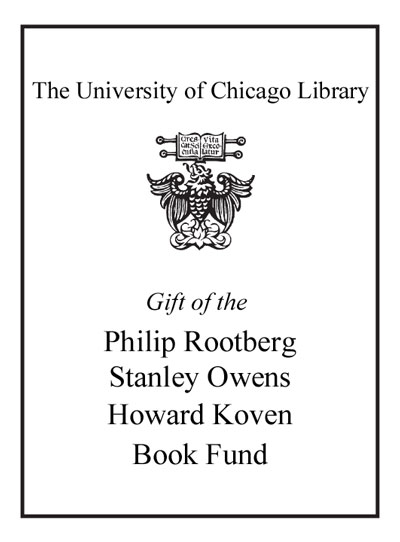The plight of Jewish deserted wives, 1851-1900 : a social history of East European Agunah /
Saved in:
| Author / Creator: | Sperber, Haim, author. |
|---|---|
| Imprint: | Eastbourne ; Chicago, IL : Sussex Academic Press, 2023. ©2023 |
| Description: | 185 pages : illustrations ; 23 cm |
| Language: | English |
| Subject: | |
| Format: | Print Book |
| URL for this record: | http://pi.lib.uchicago.edu/1001/cat/bib/12867351 |
MARC
| LEADER | 00000cam a2200000 i 4500 | ||
|---|---|---|---|
| 001 | 12867351 | ||
| 008 | 220711t20232023enka b 001 0 eng d | ||
| 005 | 20230516214135.7 | ||
| 035 | 9 | |a (GOBI)99992945223 | |
| 040 | |a UKMGB |b eng |e rda |c UKMGB |d QGJ |d OCLCF |d UKMGB |d CDX |d BDX |d MBB |d YDX | ||
| 020 | |a 9781789761689 |q (pbk.) | ||
| 020 | |a 1789761689 |q (pbk.) | ||
| 020 | |z 9781802071672 (ePub ebook) | ||
| 020 | |z 9781782846994 (PDF ebook) | ||
| 035 | |a (OCoLC)1338669620 | ||
| 043 | |a ee----- | ||
| 050 | 4 | |a KBM550.5 |b .S64 2023 | |
| 082 | 0 | 4 | |a 296.4/444 |2 23 |
| 090 | |a XXKBM550.5 |b .S64 2023 | ||
| 100 | 1 | |a Sperber, Haim, |e author. | |
| 245 | 1 | 4 | |a The plight of Jewish deserted wives, 1851-1900 : |b a social history of East European Agunah / |c Haim Sperber. |
| 264 | 1 | |a Eastbourne ; |a Chicago, IL : |b Sussex Academic Press, |c 2023. | |
| 264 | 4 | |c ©2023 | |
| 300 | |a 185 pages : |b illustrations ; |c 23 cm | ||
| 336 | |a text |b txt |2 rdacontent | ||
| 336 | |a still image |b sti |2 rdacontent | ||
| 337 | |a unmediated |b n |2 rdamedia | ||
| 338 | |a volume |b nc |2 rdacarrier | ||
| 504 | |a Includes bibliographical references (pages 129-171) and index. | ||
| 520 | |a "Agunot (Agunah, sing., meaning anchored in Hebrew) is a Jewish term describing women who cannot remarry because their husband has disappeared. According to Jewish law (Halacha) a woman can get out of the marriage only if the husband releases her by granting a divorce writ (Get), if he dies, or if his whereabouts is not known. Women whose husbands cannot be located, and who have not been granted a Get, are considered Agunot. The Agunah phenomenon was of major concern in East European Jewry and much referred to in Hebrew and Yiddish media and fiction. Most nineteenth-century Agunot cases came from Eastern Europe, where most Jews resided (twentieth-century Agunot were primarily in North America, and will be the subject of a forthcoming book). Seven variations of Agunot have been identified: Deserted wives; women who refused to receive, or were not granted, a Get; widowed women whose brothers-in-law refused to grant them permission to marry someone else (Halitza); women whose husbands remains were not found; improperly or incorrectly written Gets; women whose husbands became mentally ill and were not competent to grant a Get; women refused a Get by husbands who had converted to Christianity or Islam. The book explores the reasons for desertion and the plight of the left-alone wife. Key is the change from a legal issue to a social one, with changing attitudes to philanthropy and public opinion at the fore of explanation. A statistical database of circa 5000 identified Agunot is to be published simultaneously in a separate companion volume." -- publisher | ||
| 650 | 0 | |a Agunahs |z Europe, Eastern |x History |y 19th century. | |
| 650 | 0 | |a Agunahs |x Social conditions |y 19th century. | |
| 650 | 0 | |a Jewish women |x Legal status, laws, etc. | |
| 650 | 7 | |a Agunahs. |2 fast |0 (OCoLC)fst00801919 | |
| 651 | 7 | |a Eastern Europe. |2 fast |0 (OCoLC)fst01245079 | |
| 648 | 7 | |a 1800-1899 |2 fast | |
| 655 | 7 | |a History. |2 fast |0 (OCoLC)fst01411628 | |
| 776 | 0 | 8 | |i ebook version : |z 9781802071672 |
| 929 | |a cat | ||
| 999 | f | f | |s d3222ca1-badf-49c0-a735-fa77b306cb3a |i 523c09fe-5bfa-4971-8dc2-c03b7fdf6c62 |
| 928 | |t Library of Congress classification |a XXKBM550.5 .S64 2023 |l JRL |c JRL-Gen |i 13005145 | ||
| 927 | |t Library of Congress classification |a XXKBM550.5 .S64 2023 |l JRL |c JRL-Gen |e ROOT |b 118481172 |i 10462104 | ||

